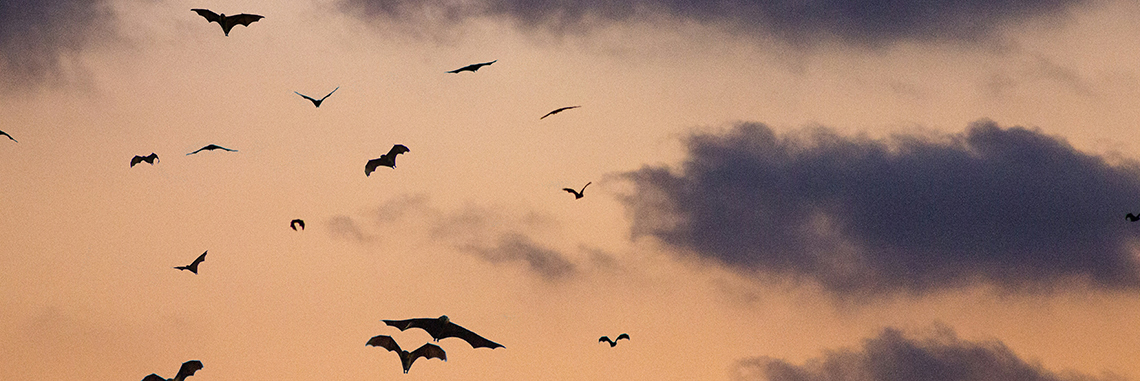Bats Are a Winegrowers Best Ally

By Jose Luis Gallego, environmental communicator (@ecogallego)
Bats play a crucial role in the maintenance of natural ecosystems. For farmers, they are also outstanding allies in combating pests that afflict all kinds of crops, because bats act as a natural insecticide. Consequently, all species of bats, most of which are at risk of extinction, enjoy strict legal protection under local, national, and European laws.
With more than a thousand different species represented in the order Chiroptera, bats are, strictly speaking, flying mammals. To conquer the airspace, they developed the phalange – or digital bones – of their forelimbs considerably, uniting them with a thin membrane called “patagium”, which extends from the arms to the feet as though it were a featherless wing.

Bats in flight
As a curious sidenote, the bat patagium is a natural “invention” that inspired the famous wingsuit used by extreme sports enthusiasts to practice this daredevil form of motorless flight.
As if this were not impressive enough, bats specialized in nocturnal flight, in complete darkness, to limit their number of competitors and enemies. Given that they are practically blind, bats developed a sophisticated system of echolocation that guides them in flight, allowing them to avoid obstacles and detect the presence of a mosquito or moth at great distances. Incredibly voracious, some species can hunt up to several thousands of flying insects in a single night. For this reason, bats are one of the farmer’s best allies.
A few years ago, I discovered how important this alliance can be thanks to a story told by one of the world’s leading bat experts: the American ecologist and conservationist Dr Merlin Tuttle, founder of Bat Conservation International, an association dedicated to the study and protection of bats.
One day, Merlin went to visit a farmer who was bothered by a colony of bats that had settled in a cave close to his farm. The sight of the animals flying in and out of the cave at dusk, in an enormous formation, and heading for the farmer’s fields was truly spectacular. “I will pay you whatever you want,” the farmer said, “But get these damn flying rats out of here or we will have to move – my family is terrified.”
When they arrived at the cave, Merlin noticed that the ground was covered in a thick layer of a crunchy, sparkling residue. He grabbed a handful and lifted it up for the farmer to see. The farmer’s eyes widened in surprise: they were the chitinous remains of the potato beetle.
“Bats eat them,” Merlin said, looking at the farmer, “Your potato fields are their pantry.” The surprised farmer asked, “How many do you reckon they eat?” to which Merlin responded, “Based on the size of the colony, I would say about 50 kilos per night.”
50 kilos of potato beetles per night! Suddenly things began to add up for the farmer. This was why his farm was one of the most productive in the region, why he saved all that money his competition spent on pesticides, why he didn’t have to buy fertilizer (bat guano is excellent for the plants, Merlin pointed out), and this is why he managed to get his potatoes certified organic.
The man who hours before had wanted to get rid of the bats now did a quick bit of math: each individual bat could be valued at 100 dollars. This marked the birth of the biggest bat champion in all of Arkansas!
Potato fields aren’t the only crops that reap the benefits of this effective ally. There are a great number of crops that improve their yields thanks to bats, including vineyards.
Among the flying insects that bats enjoy as part of their diet is the grapevine moth (Lobesia botrana): a lepidopteran that is regarded as one of the worst grapevine pests. This is why many winegrowers around the world are installing bat boxes in their vineyards to create additional roosting places. Each artificial nest can accommodate a colony of more than a hundred bats, which can capture hundreds of thousands of moths in a single night while fertilizing the soil with their droppings.
A nesting box installed on a tree on the Familia Torres estate, providing a safe bat refuge
Bats: winegrowers will find no other biological pest control system that is as effective in combating the dreaded grapevine moth.
